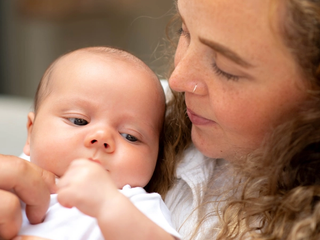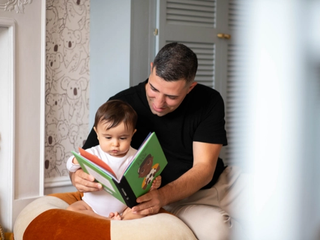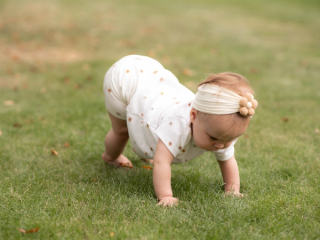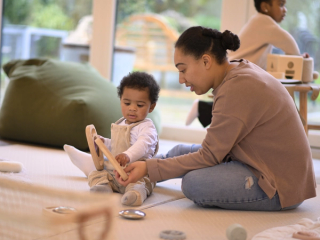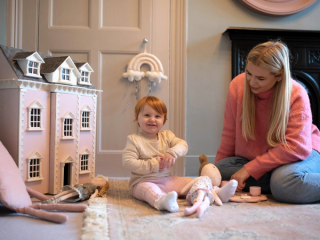
- Home
- Advice Hub
- Baby
- Bonding & Development
- How To Resolve Early Wake - Ups?
How to resolve early wake-ups?
Are you finding yourself part of the 5am club for all the wrong reasons? You're not alone. Let's delve into the various factors contributing to early wake-ups and explore effective strategies to overcome them.
Are you finding yourself part of the 5am club for all the wrong reasons? Does your baby wake up too early, leaving you feeling exhausted and in desperate need of more sleep? You're not alone. Many parents face the daunting challenge of early risers, but fear not, there are practical steps you can take to address this issue and regain those precious hours of rest. Let's delve into the various factors contributing to early wake-ups and explore effective strategies to overcome them.
Assess their sleep quota
Babies require ample sleep to support their growth and development, but it's possible that by the time the early hours roll around, they've already reached their sleep quota for the night. Take note of what time your little one is hitting the hay. If bedtime is too early, consider gradually nudging it later by 15 minutes every few days until you notice an improvement. This adjustment allows for a more balanced sleep schedule, ensuring that your baby gets the rest they need without waking up too early.
Combat overtiredness
On the flip side, overtiredness can also be a significant contributor to early wake-ups. If your baby isn't napping well during the day or is staying awake for extended periods before bedtime, their sleep may be disrupted, leading to premature awakening. Focus on improving nap times and consider bringing bedtime forward on days when naps haven't been optimal. By ensuring that your baby is well-rested throughout the day, you can help prevent early wake-ups and promote more restful sleep.
Check the environment
External factors such as light and noise can significantly impact your baby's sleep quality. Invest in blackout blinds to keep the room dark during those early morning hours, preventing unwanted sunlight from disrupting their sleep. Additionally, consider using a white noise machine to mask any outside sounds that might be rousing your little one from their slumber. Creating a calm and conducive sleep environment is essential for promoting uninterrupted sleep and reducing the likelihood of early wake-ups.
Consider nap timing
Your child’s nap schedule – and in particular the timing of your child's first nap of the day – can also play a crucial role in their sleep patterns. If your baby is waking at 5am, it may be that they're not making it to an appropriate nap time for their age and they are falling asleep very early in the day. Allowing your baby to nap too early can inadvertently reinforce the early rising pattern, as their body clock adjusts to this new schedule. For babies younger than 10-12 months, consider implementing a bridging nap strategy. This involves putting your baby down for a short nap (or a contact nap) around 7am, but limiting it to 10-15 minutes maximum. This brief nap takes the edge off their tiredness, helping them make it through to a more regular nap time later in the day. However, for older babies, bridging naps may become less effective. In this case, you'll need to gradually push your baby's nap time later by around 15 minutes every couple of days. By adjusting the timing of your baby's first nap, you can help establish a more consistent sleep schedule and reduce the likelihood of early wake-ups.
Break the habit
Early rising can quickly become a habit for babies, as their internal body clocks become attuned to waking up at the same time each day. To break this cycle, gradually shift your baby's wake-up time by a few minutes each day until you reach your desired wake-up time. Whilst your baby may not stay asleep initially during this transition you can help their body learn it is still sleep time. Keep the environment calm and minimize interactions to signal to your baby that it's still sleep time. By consistently reinforcing this new wake-up time, you can help reset your baby's internal clock and promote more restful sleep in the morning.
In conclusion, managing early wake-ups requires patience, consistency, and a proactive approach.
Remember to be patient as you implement these changes and don't hesitate to seek guidance from a paediatrician or sleep specialist if you need additional support. By addressing the underlying factors contributing to early wake-ups and implementing effective strategies, you can help your baby establish healthy sleep habits and ensure a more restful night's sleep for the whole family.
Advice & tips

Want to read more? Join the HiPP BabyClub for full access to this article.
As a BabyClub member, you'll get access to a range of exclusive benefits, including:
Monthly competitions
Discounts from our Partners
Expert advice tailored to your little one's age
Weaning recipes
HiPP shop discounts*
*10% off HiPP's online shop does not apply to our First Infant, Anti-Reflux or Comfort Formula Milk.
Important notice: Breastfeeding is best. Follow on milk should only be used as part of a mixed diet from 6 months. Talk to a healthcare professional.






